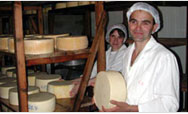Fighting Fires Brings Communities Closer
A volunteer fire department puts professionalism and compassion
above all else
It was a cloudy afternoon in May when Tane Gorgovski got the call. A large barn was on fire in a small ethnically Albanian village about seven kilometers away from the Krivogashtani volunteer fire department headquarters. But the village was not in Gorgovski’s jurisdiction. Furthermore, in some parts of Macedonia, ethnic Macedonians and ethnic Albanians traditionally keep a distance from one another. Local elections were being held that day and the fire could have meant trouble.
 |
| Firefighter Tane Gorgovski (right) shakes hands with Rizvan Memedovski whose farm was saved thanks to the quick response of the Krivogashtani volunteer fire department |
Gorgovski didn’t stop for a second. He and his fellow volunteers arrived within ten minutes— the first on the scene. It was a fierce fire which wasn’t extinguished until 9:30 that evening. All in all, three vehicles from neighboring communities arrived. Water tanks had to ferry water to the scene three times. Although the barn was lost, everyone at the farm survived.
“We would have lost the house,” says Rizvan Memedovski, the owner of the farm. He pauses. “Someone could have been killed.”
Memedovski stands in the courtyard of his traditional home. His extended family sort bright green tobacco leaves under a veranda. Garlands of leaves are strung along the side of the rebuilt barn, and poultry strut about. Neighboring homes are clustered together side-by-side separated by stone walls. The fields cultivated by these farmers are situated outside the village. It’s easy to see how a fire could quickly spread and wipe out dozens of small homesteads.
The Association of Volunteer Firemen of Krivogashtani was established in the 1950’s, but had almost ceased to exist in 2002 when a group of individuals from the community decided to take action. There are now 10 active volunteers who offer a 24-hour service in three shifts.
USAID donated new firefighting equipment to the Association in 2004. Hoses, clothes and oxygen bottles, lamps, and radio stations were purchased. The office headquarters was also reconstructed through a collaborative effort: the community provided the labor while USAID provided the materials. In 2005, USAID provided even more equipment, including a portable motor pump, an electric power generator and flood lights.
Krivogashtani is a small village in a valley surrounded by high mountains. Small roads lead into the foothills passing through villages. The area is largely agricultural, with tobacco as main crop. Barns here are filled with drying leaves and hay and barn fires are common. Larger communities with full time professional fire fighting teams are some distance away. Last year alone, the Krivogashtani station responded to 20 fires.
“We have lived here for centuries,” says Gorgovski. “We are a community and we all know each other. We must look out for each other.”
Gorgovski is trained and has worked in the wood processing industry. His strong rough hands are testimony to a career that has involved plenty of manual labor.
Besides fires, the team responds to road accidents and other incidents. Last year, a school bus rolled over and caught fire. The team responded within minutes and managed to rescue all of the school children and the driver.
The team spirit and volunteerism of the Krivogashtani firefighters in a perfect example of what USAID/Macedonia’s Community Self Help Initiative aims to achieve. The program assists community groups to plan and implement projects that promote democracy and ethnic harmony and provide sustainable benefits to their citizens. Although the project is wrapping up, it has left a legacy through hundred’s of similar small scale projects.
Amongst those who have worked on the project, a slogan has been adopted: “people who get involved, stay involved.” And this seems to ring true in Krivogashtani. There is little turn over amongst these firefighters, who train twice a month and do not receive any pay for their work.
“When I visit the families we’ve helped, fighting fires in the past, like we did today,” says Gorgovski, “I see how much we meant to them. That’s all the reward I need.”
Back to Top ^
|


